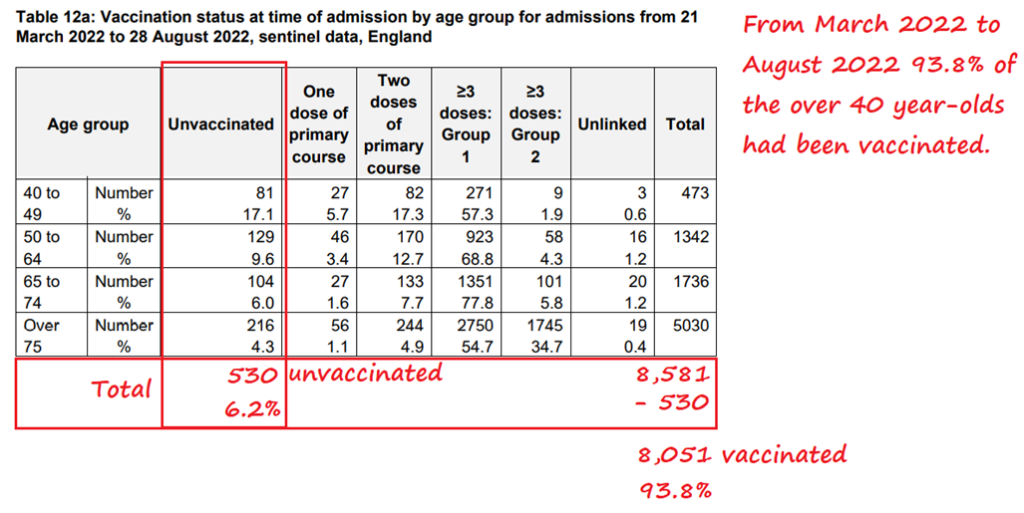

How to Talk to Your Friends About the Vaccines Without Alarming Them
In an article last week I highlighted the Government’s missed opportunity in focusing on vaccines rather than weight loss and healthy living in the fight against Covid. A research paper published in the Lancet implied that a two-point BMI reduction (that’s about 6kgs, 14lb or 1 stone) delivers the same level of risk reduction against serious disease as is claimed for a Covid booster shot four months after vaccination. However, while the vaccine’s protection wanes to virtually zero after six months, losing weight and keeping it off delivers consistent equivalent Covid protection and, additionally, reduces the risk of type 2 diabetes, heart attack and some cancers and improves general well-being. Good news both for you and the NHS.
Information like this seems to me to be the kind of thing people are looking for, particularly now as they become increasingly hesitant about getting ever more shots of vaccine.
From my own interactions I sense a significant turning of the tide in people’s perception of the vaccines and the pandemic in general. A number of people have commented to me that last year in the first few months of the football season – and while the booster campaign was going strong – virtually no top-flight game was complete without a player collapsing on the field (Christian Eriksen and John Fleck come to mind), an ‘incident in the crowd’ or a pundit (Trevor Sinclair) potentially facing the sack for daring to muse ‘whether the vaccine had anything to do with it’. This year, and in the absence of a booster campaign targeting the age profile of the typical football spectator, I haven’t heard of any such incidents, have you? I’ve no specific evidence that vaccines caused the problems but, along with millions of others, it made we wonder.
It’s not only football fans who’ve had a double take. You won’t be surprised to know that sometimes I’ve been accused of ‘preaching to the choir’. There’s some truth in this. However, recently, a friend of mine, who is both metaphorically and literally in the choir asked me for some simple facts that were easily verifiable that she could use with her fellow choristers without them thinking she was a tin-foil hat wearer. She went on to explain that several of them had become increasingly sceptical about all aspects of the Covid hysteria and weren’t at all sure about having any more doses of vaccine. She wanted an easy-to-find and easy-to-verify argument from an irrefutable source that wouldn’t scare them. This is what I’ve come up with. I thought some of you may find these kinds of points useful in your own interactions with waverers.
The rationale for vaccines has always rested on three legs.
- Reduction in infection. Does anyone assert this anymore? I don’t think so. However, if you’d like to see an excellent explanation of how the data can be manipulated to make you think they’re effective, can I recommend this short Norman Fenton film.
- Reduction in deaths. I wrote an article published July 27th 2022 showing from official UKHSA data that deaths of the unvaccinated were proportionately no greater than the vaccinated.
- Reduction in hospital admissions. Let’s test this one out!
The UKHSA claims about 85% vaccine efficacy against hospitalisation in the first few months, falling to about 60% after six months (see figure 5 below). If this was really the case, wouldn’t you expect fewer Covid hospital admissions since the vaccines were rolled out? Well, that’s the odd thing, hospital admissions have increased.
Figure 1 tells us that to date in 2022 there have been 44% more Covid hospital admissions than in the same period in 2021. What’s more, already in 2022 we have had 12% more hospital admissions than in the entirety of 2021.
There have been 39% more Covid hospital admissions in the first 289 days of 2022 than there were in the 289 days from March 19th 2020 to the end of December 2020.


Whenever I mention Covid hospital admissions, I’m required to mention that not all the people admitted with Covid are in hospital because of Covid – for many it’s an incidental infection. But, of course this was always the case. The definition of a Covid hospital admission hasn’t changed, we’re comparing apples with apples.
Where does this unlikely sounding data come from? Well, I’m delighted to tell you it’s hidden in plain sight in the Government’s Coronavirus Dashboard. Figure 2 reproduces the familiar graph that you see if you visit the website and click on the Healthcare tab.


I know some readers like to verify the data themselves. To do so, go to the Coronavirus Dashboard, click on the Healthcare tab. Then click on the ‘Download’ button in the bottom left hand corner and extract the data as a csv file, which will open in an Excel spreadsheet. You can then reproduce any of the charts printed here. In figure 3 I’ve circled in red the ‘download’ button and I’ve highlighted the time periods I’ve shown separately back in Figure 1.


We can also simply present the data cumulatively (see Figure 4). If you draw a line from the bottom left-hand side to the top right hand corner you’ll notice that the trajectory of the line is a very close fit to the actual wavy line of hospital admissions. The straight line is indicative that hospital admissions are accumulating over time at a constant rate (albeit with waves on the way).


If vaccines really delivered 85% or even 60% efficacy against hospital admission you would expect to see the line kink down as the vaccines were rolled out, but you don’t. The peaks and troughs in the line have flattened but the trajectory has stayed amazingly consistent.
Figure 5 shows the claimed efficacy for the various vaccines following various doses taken from the UKHSA’s week 40 (the latest) vaccine surveillance report (page 14). I’ve put a red box around the hospital admission rates.


In the same report, though admittedly 35 pages further on, the actual number of hospital admissions by vaccine dosage is shown in table 12a. The figures are for about a five month period from March to August 2022. Only 6.2% of the people hospitalised were unvaccinated. As we know, there’s an ongoing dispute about the actual level of vaccination. For the over 40s the rate is probably somewhere between 80% and 90%, so whichever way you look at it the vaccinated are proportionately more likely to be hospitalised with a positive Covid test than the unvaccinated are. At most, 90% of the over-40s are vaccinated yet they account for 93% of those admitted to hospital (though admittedly there is a degree of age confounding here, as older people are more likely to be vaccinated and also more likely to be hospitalised).


Going back to my friend, the chorister, I think she can show this Government data to her choral friends with confidence. It’s from a reputable source. It doesn’t make any claims about vaccine dangers. It simply suggests that if you decide not to be vaccinated you’re at no more risk than if you were vaccinated.
Personally, I think frightening people with stories of vaccine harms isn’t terribly productive. Much better to focus on solutions than problems. If you have friends who are wavering in their enthusiasm for yet another vaccine, point them in the direction of the benefits of losing weight and general health. Point out that in not getting a further jab they’re inviting little or no greater risk, as can be seen from the hospital admission data. Maybe gently point out that the Scandinavians and Floridians have throttled back their vaccine campaigns and that in the U.K. we don’t appear to be offering a further booster to the under-50s.
Maybe by taking a gentle approach rather than blurting out “I told you so!” it will mean that some of your fractured friendships can be healed as people realise you weren’t a swivelled eyed loon after all. No one likes being told they were wrong.
As Charles Mackay said: “Men go mad in herds, while they only recover their senses slowly, and one by one.”







